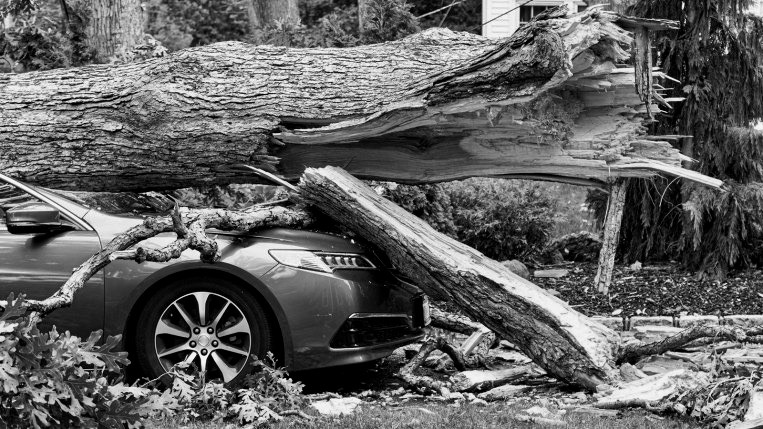Inside this section
What is comprehensive insurance?
There are several factors you need to think about when you’re looking at your auto insurance. We think about auto insurance as a way to protect us if we get into an accident, but what about if your vehicle is damaged without actually being involved in an auto accident? Like if a tree branch falls on your parked car, your windshield gets a chip in the glass or a deer suddenly runs out in front of your car while you’re driving, then what? Your comprehensive insurance covers you and will help get things back to normal.
What does comprehensive insurance cover?
Collision insurance helps you fix or replace your vehicle when you get into a car accident. However, collision insurance doesn’t cover the other stuff that can inflict damage on your car. That’s where a comprehensive insurance policy can protect you. Here’s a list of some of the things a comprehensive policy would cover:
- Fire and explosions
- Vandalism, such as when someone keys or tags your car
- Theft-related damage, for example, damage caused when breaking into the vehicle
- Storms, such as wind, hail, tornadoes, floods, earthquakes and hurricanes
- Falling objects such as a tree limb falling on a parked car, or if someone’s hauling materials and something falls and lands on your car
- Windshield cracks and chips
- Animal-related damage, such as damaged caused by hitting a deer that leaps into the road
Comprehensive insurance can also make life easier after your vehicle has been damaged. At Assure America, car rental coverage is available in the event of a comprehensive loss.
View the Full Guide to Collision Vs Comprehensive Car Insurance here.
What does comprehensive insurance not cover?
- Damages caused by a collision
- Damages caused to another person’s vehicle
- Damages caused by running into a stationary object, such as a tree or building
- Medical expenses incurred by you or other drivers or passengers
What is comprehensive vs. collision?
There’s an easy way to understand the differences between the two kinds of coverage. It comes down to the question of what happened to the car to damage it?
Collision insurance covers you when your car was in an accident, whether it was with another vehicle or an inanimate object, such as a guardrail, pothole, tree or building. It depends on the accident, of course, but in many instances, it insures you against things within your control.
Comprehensive insurance covers you when things besides a car accident damage your car, such as a falling tree branch, a break-in or hail damage from a storm. These things are considered beyond your control.
Many lenders require drivers to carry both collision and comprehensive on their policies. When the car is owned outright, these coverages can be optional*.
Does comprehensive insurance cover theft?
Car theft can mean different things. These are the kinds of things that are covered under a comprehensive insurance policy.
- A car break-in: Comprehensive insurance can help you cover your expenses to fix the broken lock or smashed window, as well as damaged or stolen fixtures on your car when it’s vandalized or broken into.
- Stolen car: If your vehicle is never recovered, the collision insurance will cover the actual cash value of your car, minus the deductible. When your vehicle is stolen, report it to the police as well as your insurance company as soon as possible.
- What about personal items? When you have comprehensive or collision coverage from Assure, your policy may come with some coverage for items stolen from your car. Check your policy or contact your Assure America Agent to learn more.
When is comprehensive insurance required?
When you have a car loan, your lender may require you to take out comprehensive and collision insurance. That makes sense: If you’re financially shielded, you’re more likely to make on-time loan payments.
Do I need comprehensive coverage for my older or paid-off car?
Once your car is paid off, having comprehensive coverage is optional.
As your car gets older, the overall replacement cost of your car can be a factor in whether you want to continue. Here’s one measure offered by the Insurance Information Institute: Multiply your premium for comprehensive by 10. If the value of the car is worth less than that total, it may be a good time to drop comprehensive. (And put the savings toward your emergency fund.)
____________________________________________________________________________________________
Call our corporate office at (304) 723-4600 or contact us at any of our locations in Weirton, Wellsburg and Chester in West Virginia; Steubenville, Ohio; Louisville, Kentucky; or Pittsburgh, Pennsylvania.


